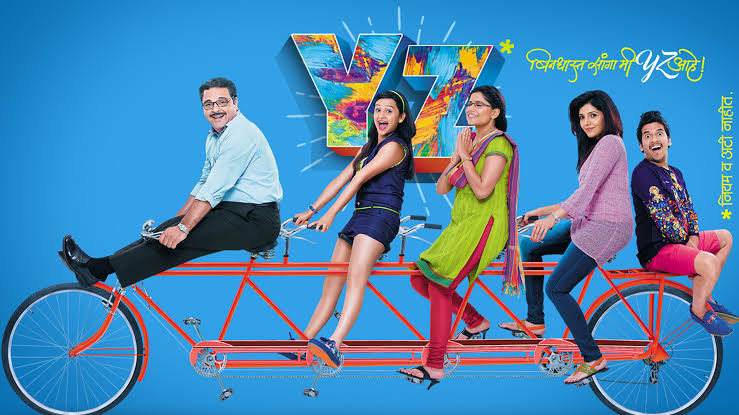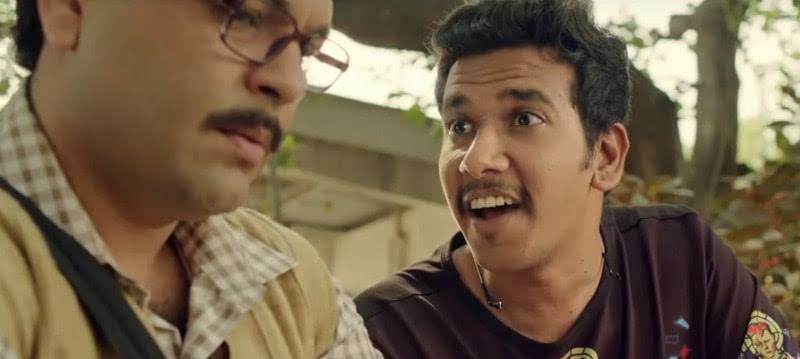YZ (2016)
I had watched this film years ago when it released, but back then I didn't have the maturity nor the understanding to truly recieve what the film was about. Years later, just a few days back, I decided to watch this film again, because I knew that I missed out on a good film just because it released when I was young and naive.
The film revolves around Gajanan Kulkarni, a middle aged man who is desparate for seeking love but not ready to compromise just for the sake of it, a man fighting between what he wants with life and what he is getting.
Firstly, I want to appreciate the storytelling narrative of the movie, which was on point and engaging enough to hook you deep into the world of Gajanan. I love the connection with the quirky side of Gajanan where he imagines himself and people associated with him to be old history characters, which comes from his own love for history.
The film has bang-on comic scenes which is backed by the impeccable comic timing of Sagar Deshmukh and Akshay Tanksale (Gajanan and Battees respectively).
Sai Tamhankar, Parna Pethe, and Mukta Barve - the three amazing ladies in the film have portrayed their characters extremely well, leaving a piece of their beautiful selves with Gajanan forever.
When I started watching this film, in the beginning it felt like a comic tale of finding the perfect match for Gajanan. But by the end of the film, it becomes so much more than just finding a partner or finding love. It swiftly takes you through Gajanan's journey of self discovery.
'Battees' played by Akshay Tanksale becomes the guiding force of Gajanan, and helps him regain his lost self-confidence and assertiveness in nature. Although the intention of Battees was to instill enough self-trust in Gajanan so as to find him a woman who would want him, the self-trust comes to use for a different cause which is actually finding what Gajanan himself really wants.
There are various dialogues and scenes in the movie that are powerful in terms of the storytelling.
The scene where Gajanan asks Battees - "मी करून टाकु का लग्नं पर्णरेखा बरोबर? आई, बाबा, सगळ्यांच्या विरोधात जाऊन काय मिळणारे?"
Battees asks him - "तुम्हाला हे लग्नं करायचंय की नाही?"
To which Gajanan replies "नाही."
And Battees gives him a monologue about how, as children, we knew how to ignore other people's voices and do what our heart wants. But as we grew up, we started to ignore our own voice and listen more to what others want from us. Doing this eventually made our inner child go farther away from us, and then we became adults who don't know who we really are, because we pushed our real self away in order to please the society. He goes on to say to Gajanan - "जेव्हा मिळेल तेव्हा थांबा, पण तो पर्यंत तुम्ही सुटा!"
Another scene is towards the climax of the movie where Gajanan opens the childhood box that Sayali gave him, and he finds the notebook where Sayali and Gajanan created a bucket list of their own. It is in that scene where Gajanan realizes how much he has lost touch with his true self, and how he had forgotten his dream of travelling the world. His tears in that scene are proof of the wide gap between how he wanted to live and how he was actually living.
"का त्या कागदाच्या तुकड्याने मला ओरडुन सांगावं की हा तु आहेस!"
As children, we have a lot of different dreams, ofcourse not all dreams are practical, but some are so close to our heart that we keep them forbidden inside the deep gates of heart and promise ourselves that someday we'll fulfill those. When we are kids, the world asks us "what do you want to be when you grow up?" And as we grow up, the world starts deciding for us what we should become. As a result, the dreams that are safely enclosed in our heart start to dissolve somewhere inside, leaving us feeling stranger with our own self. Because what is our identity without all of our dreams, right?
I want to talk about an important scene in the movie that can go very easily unnoticed. When Aarti asks Gajanan what would he have named himself, if he had gotten the chance. He doesn't have a reply at that time. Towards the end of the film, Gajanan goes up to her and says "मला सिद्धार्त हे नाव खूप आवडतं."
Siddhart, a reference to the life of Gautam Buddha who gave up on worldly desires and was named 'Siddharta' which means "one who achieves his goal".
Gajanan's stance of giving up on the worldly desire of marriage and choosing to fulfill his dream instead, is a great association of the name he chose. Gajanan was now no more a man who listens to what his mom wants him to do or what the society expects him to do, he is now a man who knows what he wants, stands up for his own life goal fearlessly and follows what his heart truly aspires to be.
(This is my personal interpretation of the scene).
Also, a special shoutout to the song at the end 'मीची मज व्यालो' that is a musical ode to one's realization of self identity and self love.
This is a film I can keep going back to, whenever I need my heart to feel good about choosing what I want. There's a line that will always stay with me, in the scene when Gajanan reads his childhood bucket list and the narration goes on in the background saying "हा तु आहेस, चुकायला न घाबरणारा". Back when we were kids, we weren't afraid to fail, we weren't afraid to make mistakes, because we were so much more excited to learn from those. God knows who/what made us fear failure as we grew up.
YZ - A beautiful tale of finding self and most importantly choosing self!
Available on Prime Video!💛
Thankyou for reading :)






Comments